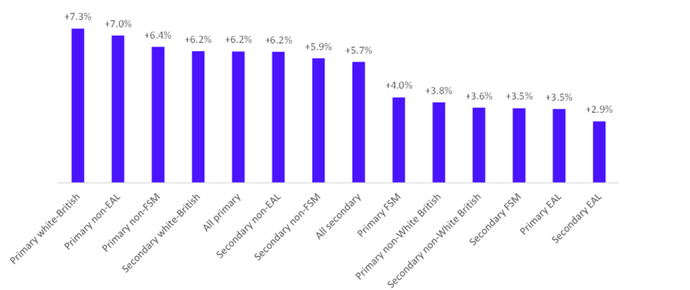Prime Minister’s policy of “levelling up” school funding benefits affluent pupils more, new research finds
|
New analysis from the Education Policy Institute (EPI) of the
government’s latest school funding settlement finds that funding
increases are set to disproportionately benefit pupils from more
affluent backgrounds. In July, the Prime Minister unveiled the
government’s school funding settlement for 2021/22, which included
details of how funding would be allocated to schools in England
through the National Funding Formula. This funding settlement
forms...Request free trial
New analysis from the Education Policy Institute (EPI) of the government’s latest school funding settlement finds that funding increases are set to disproportionately benefit pupils from more affluent backgrounds. In July, the Prime Minister unveiled the government’s school funding settlement for 2021/22, which included details of how funding would be allocated to schools in England through the National Funding Formula. This funding settlement forms part of the government’s overall plans to increase the schools budget by £7.1bn in cash terms by 2022-2023 – part of a wider government pledge to “unite and level up the nation.” However, a new paper published today (Friday 7th August) by EPI shows that, because of the way that the government allocates funding to schools, pupils from disadvantaged backgrounds (those eligible for free school meals) will receive less additional funding from the government’s latest settlement than their better-off peers.
The analysis shows that over a four-year period,
disadvantaged pupils will have received real terms funding
increases at around two-thirds the rate of their better-off
peers. Key findingsUnder the 2021/22 funding plans, in primary schools:
Differences in pupil funding allocations become even more pronounced when examining funding changes since 2017/2018, the last year before the introduction of the government's National Funding Formula. Change in per pupil funding by pupil characteristics between 2017-18 and 2021-22 (real terms)
Why pupils from certain backgrounds are receiving more additional funding than others The National Funding Formula for schools, introduced from 2018, is built on the principle that pupils with the same characteristics should receive the same level of funding, regardless of where in the country they go to school. However, the Prime Minister’s drive to “level up” school funding appears to be distorting this aim. A policy of “levelling up”, which guarantees minimum levels of funding for all schools, means that more funding is directed towards schools that have previously been funded at a lower rate; schools which on average, have fewer pupils from poorer backgrounds. While the school funding system in England remains progressive, with pupils from low income backgrounds continuing to attract more funding overall than their more affluent peers, analysis shows that the link between school funding and pupil need is beginning to be unravelled. These changes come at a time when there is emerging evidence of the disproportionate effects of the COVID-19 pandemic on pupils from disadvantaged backgrounds. EPI research has shown that poorer pupils are already 18 months in learning behind their peers by time they finish their GCSEs, and even prior to the pandemic, progress in narrowing that gap was beginning to stall. * * * Commenting on the new analysis, Jon Andrews, author and Deputy Head of Research at the Education Policy Institute (EPI), said: “Our analysis shows that the longstanding link between school funding and pupil need is being eroded by the policy of ‘levelling up.” “By directing a proportion of additional funding towards schools with historically lower levels of funding, the government is ensuring that pupils from more affluent backgrounds see greater increases than those from poorer backgrounds. The result is that over a four-year period, disadvantaged pupils will have received funding increases at around two-thirds the rate of their better-off peers.” David Laws, Executive Chairman of the Education Policy Institute (EPI) said: “School closures this year will have been especially harmful for the learning outcomes of the poorest pupils. Those from disadvantaged backgrounds will need maximum support to ensure their life chances are not damaged by this period of disruption. But by skewing extra funding towards more affluent pupils, the government’s approach of ‘levelling up’ school funding is fundamentally at odds with this goal.” “Now more than ever, we need well-targeted policies to prevent a real social mobility setback in this country. There appears to be very little evidence of this in the government’s latest school funding plans.” Ends. The full analysis paper, School funding allocations 2021-22, can be accessed here:https://epi.org.uk/wp-content/uploads/2020/08/NFF_2021-22_EPI-Analysis.pdf (00.01 Friday 7th August embargo). |

